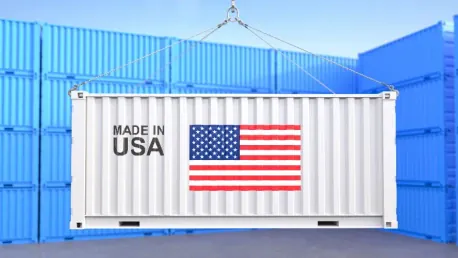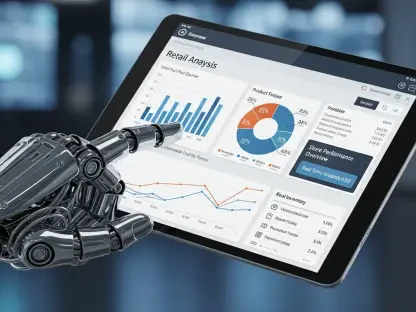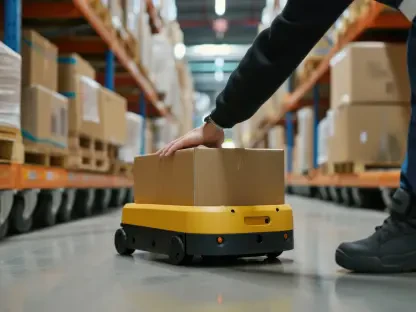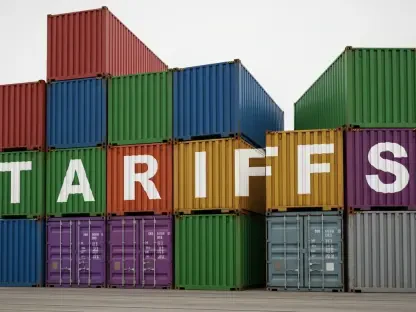The significant role of cross-border trade between the United States and Mexico has played a pivotal part in narrowing technological gaps, fostering growth in logistics infrastructure, and propelling Mexico into a prominent position within global supply chains. Over the past decade, this collaboration has seen numerous developments and strategic moves that highlight Mexico’s growing importance in international trade. With burgeoning technological advancements, this growth shows promise for sustaining and bolstering the economic relationship between the two nations.
The Surge in U.S.-Mexico Trade
Record-Breaking Trade Figures
The increasing flow of trade between Mexico and the U.S. has become remarkably evident, with Mexico currently holding the top position as the leading U.S. trade partner. The year 2023 alone witnessed cross-border commerce between the two nations reaching a staggering $798 billion. Projections indicate that this impressive figure is expected to be surpassed in 2024, underscoring the critical importance of this trade route. On a daily basis, an average of 13,000 shipments are moved between Mexico and the U.S., highlighting the heavy traffic and economic significance of this collaboration.
Such substantial figures in trade reflect the deeply intertwined economies of both nations, illustrating how essential their partnership has become. The remarkable surge in trade between the U.S. and Mexico has led to increased demand for more efficient logistics operations. However, to fully capitalize on this trade potential, it is crucial to address the technological barriers that currently hinder seamless logistics processes. Advanced technology plays a vital role in streamlining operations, reducing costs, and enhancing security — all crucial factors in maintaining and expanding the cross-border trade relationship.
Addressing Technological Barriers
Fernando Correa, CEO and co-founder of Cargobot, insightfully notes that while Mexico is already a pivotal player in global supply chains, significant investments in technology are essential to streamline logistics operations and enhance security. Cargobot, an international freight technology firm founded in 2016, connects shippers and carriers across North America. The company has recently introduced a new planning tool named Planimatik, designed to simplify carrier onboarding and logistics operations. By addressing these technological barriers, Mexico can fully realize its potential as a major trade player.
Logistic operations in Mexico present distinct challenges in comparison to the U.S., due to additional layers of security and verification. Correa emphasizes the importance of building a reliable network of carriers to mitigate these complexities. Planimatik’s introduction aims to enhance logistics efficiency by offering tools that facilitate seamless connections between shippers and customs brokers. This innovation eases logistics processes, fulfilling the need for a robust technological infrastructure to support Mexico’s position in global trade. It underscores the necessity of continuous technological advancements to maintain a competitive edge in the dynamic trade environment.
Technological Advancements and Investments
The Role of Planimatik
Planimatik is a significant addition to Cargobot’s suite of logistics tools, designed to address the intricacies of Mexico’s logistics operations. By providing an intuitive platform for shippers, carriers, and customs brokers, Planimatik simplifies various aspects of the logistics process. From carrier onboarding to real-time tracking of shipments, the tool enhances operational efficiency and ensures smoother cross-border movement of goods. Ultimately, this technological advancement represents a strategic move to overcome existing logistical challenges, bolstering Mexico’s role in international supply chains.
In a landscape where the reliability and security of logistics operations are paramount, Planimatik stands out as a pivotal innovation. Its implementation is expected to drive significant improvements in how logistics activities are managed, ultimately leading to cost savings and faster delivery times for businesses involved in cross-border trade. This tool aligns with the broader goal of enhancing technological capabilities within Mexico’s logistics sector, fostering a more efficient and secure supply chain. By addressing the technological gaps that previously hindered seamless logistics operations, Mexico is better positioned to capitalize on growing trade opportunities with the U.S.
Venture Capital and Startup Ecosystem
Supporting the technological evolution in Mexico is its burgeoning startup ecosystem, which has attracted close to $10 billion in venture capital since 2015. Research from Quantico’s 2024 Venture Capital Report for Mexico reveals that Mexican startups have garnered $9.89 billion across 1,897 funding rounds over the past decade. This investment boom underscores Mexico’s ascent as a leader in venture capital within Latin America, fostering innovation and entrepreneurship. The notable influx of venture capital has enabled Mexican startups to develop innovative solutions that address critical challenges in logistics and other sectors, driving digital transformation.
Investment in the technological sector has been particularly notable, with startups focused on areas such as logistics and commercial transportation gaining traction due to the critical need for digital transformation in these industries. One of the notable instances of significant venture capital in Mexico occurred in 2021 when startups raised a record $3.6 billion, led by notable investments such as Kavak’s $810 million financing round. Although 2022 saw a reduction in this boom, with a total of $1.14 billion raised, it still marked a 1% increase over the previous year, indicating sustained interest in Mexican innovation.
Growth in Tech Talent
Mexico’s Tech Talent Pool
Mexico’s rise as a hub for tech talent is a noteworthy aspect of the nation’s growth story. According to BairesDev co-founder Nacho De Marco, Mexico has developed a vast pool of tech professionals, making it an attractive destination for tech firms looking to expand. The global real estate investment firm CBRE’s report affirms this, noting Mexico City’s surpassing of Sao Paulo, Brazil, as the largest tech talent market in Latin America with 300,000 tech professionals. This significant pool of tech talent provides a solid foundation for the continued growth and competitiveness of Mexico’s technology sector.
Monterrey, Mexico, has also witnessed a remarkable 125% growth in tech talent over the past five years. This surge in tech talent highlights the country’s potential as a global tech hub. BairesDev itself has seen a 99% increase in Mexico-based talent, indicating a strong trend towards leveraging local expertise. The availability of a skilled workforce is critical for the nation as it continues to attract investment and drive technological advancements. It also positions Mexico to play a central role in meeting the demands of the rapidly evolving global economy.
Factors Contributing to Tech Talent Growth
Several factors contribute to this growth in tech talent, including increased investment in STEM education, the high English proficiency among Latin American engineers, cultural and timezone affinities with the U.S., and the success of Latin American tech founders attracting venture capital. This confluence of factors creates an ideal environment for tech talent to flourish. Increased investment in STEM education ensures that the workforce is equipped with the latest skills and knowledge, while high English proficiency facilitates smooth communication and collaboration with international partners.
The cultural and timezone affinities with the U.S. further enhance Mexico’s appeal as a tech hub, allowing for seamless integration into U.S.-based projects and operations. The success of Latin American tech founders in attracting venture capital demonstrates the region’s growing reputation for innovation and entrepreneurship. These factors combined have led to a significant increase in the availability of skilled tech professionals, further positioning Mexico as a key player in the global technology landscape. The nation’s tech talent pool not only supports local innovation but also plays a critical role in driving the broader economic growth and development of the region.
Investments in Logistics Infrastructure
Strategic Real Estate Acquisitions
Significant investments in logistics infrastructure have also marked Mexico’s growth trajectory, further enhancing its role in global supply chains. Stonepeak’s acquisition of 2.3 million square feet of logistics space in Houston underscores the strategic importance of supply chain real estate near critical infrastructure such as Port Houston. This acquisition is a testament to the confidence investors have in the region’s logistics capabilities. Stonepeak’s real estate portfolio in Texas now totals 3.4 million square feet, with significant investments already made in the AllianceTexas development in Fort Worth, underscoring the strategic growth within the logistics sector.
These strategic real estate acquisitions reflect a broader trend of substantial investment in logistical infrastructure aimed at supporting the robust trade relationship between the U.S. and Mexico. By acquiring and developing logistics space near key infrastructure points, firms like Stonepeak are positioned to provide the necessary support and capacity for the increasing volume of cross-border trade. This, in turn, ensures efficiency and reliability in the movement of goods, thereby bolstering the economic partnership between the two nations. Such investments highlight the critical role that logistical infrastructure plays in sustaining the growth and development of international trade.
Expansion of Logistics Facilities
Moreover, CJ Logistics America has recently leased a 1.07 million-square-foot facility in Wilmer, Texas. This facility, located in the 252-acre Southpark Logistics Park, complements CJ Logistics’ extensive footprint, which spans over 80 warehouses and transportation operations across North America. The leasing of such a substantial facility is indicative of the strategic growth in logistics infrastructure required to support U.S.-Mexico trade. This expansion not only addresses the immediate logistical needs but also positions CJ Logistics to handle future growth in trade volumes between the two countries.
The strategic location of this facility plays a crucial role in optimizing logistics operations, providing convenient access to major transportation networks. This move also underscores the importance of having a robust logistics infrastructure to support the seamless movement of goods across borders. The combined efforts of multiple stakeholders to invest in and develop logistics facilities reinforce the strong trade relationship between the U.S. and Mexico. These investments are integral to enhancing supply chain efficiency and maintaining the competitive edge necessary for thriving in the dynamic global trade environment.
Consolidation in the Logistics Sector
Interlink Transport’s Strategic Expansion
In another move illustrating the dynamic changes in the logistics sector, Texas-based Interlink Transport, a provider of finished vehicle logistics, has acquired three logistics firms: Tennessee Auto Carriers, No Boundaries Transportation, and BST Auto Transportation. This consolidation and rebranding to No Boundaries Auto Logistics signal a strategic expansion aimed at enhancing transportation solutions for original equipment manufacturers across the Midwest and Southeastern U.S. The acquisitions represent a strategic effort to consolidate resources and expertise, enhancing the overall capacity and efficiency of logistics operations.
By merging these firms under the No Boundaries Auto Logistics brand, Interlink Transport aims to offer comprehensive and integrated logistics solutions that cater to the evolving needs of the automotive industry. This strategic expansion is not only a response to the increasing demand for efficient logistics services but also a proactive step towards positioning the company as a leader in the sector. The consolidation enhances operational capabilities, allowing for better management of logistics activities, increased reliability, and improved service delivery to clients. This move reinforces the critical role of logistics in supporting the broader trade ecosystem between the U.S. and Mexico.
Enhancing Transportation Solutions
The critical role of cross-border trade between the United States and Mexico has been instrumental in bridging technological gaps, enhancing logistics infrastructure, and elevating Mexico’s stature in global supply chains. Over the last ten years, this partnership has ushered in various developments and tactical moves showcasing Mexico’s increasing significance in international commerce. The rapid pace of technological innovation has facilitated this growth, promising a stable and strengthened economic alliance between the two nations. Not only has cross-border trade fostered economic prosperity, but it has also enabled the sharing of technology and expertise, contributing to the overall competitiveness of both countries on the global stage. This symbiotic relationship underlines the importance of sustained collaboration and investment in technology and infrastructure to maintain momentum. As we look to the future, the ongoing advancements and cooperative efforts will likely drive further integration and mutual benefits in trade, solidifying the economic bond between the United States and Mexico.









